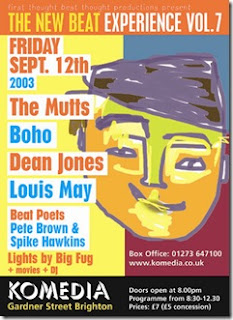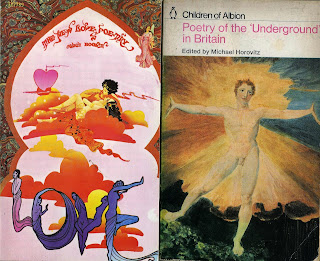 |
| Spike Hawkins by Philip Jones Griffiths |
It was message on Facebook from Marc Carey that triggered things off with a link to the 'Up Your Chuff 'Mixcloud site, featuring a just-under two-hour podcast of Mr C's 'Rock Roots Radio' show devoted to Spike and the world he inhabited.
It is composed of three audio interviews with poet Pete Brown (see below), writer Jenny Fabian {Co-author with Johnny Byrne of Groupie fame) and poet Michael Horovitz. These are interspersed with some great music and a kind of episodic, anecdotal history of the poetry/jazz scene from the late '50s through the '60s and beyond.

The show's really well put together, with some slight audio issues in places but hey, it was just like listening to Radio Caroline. Mr C knows his stuff and is enthusiastic and interested which helps make it a warm-hearted piece of work. Dotted throughout is the voice of Spike reading his own work, some great Horowitz stuff from the famous Albert Hall poetry event in 1965 - the great attendance at a poetry reading in history - and later, including recent work with Damon Albarn.
We had the privilege of presenting two great poets on one night at a 'New Beat Experience' event/happening at the Komedia in Brighton in 2003) - Spike Hawkins and Pete Brown (best known for his lyrics for The Cream [including Tales of Brave Ulysses]. As I remember it, both gave short punchy sets that were enthusiastically received. I seem to recall some sort of argy bargy with Spike. I think I just had to reassure him he would get paid. Fair enough.
Spike was blessed with a rich, fruity voice which he used to significant effect when performing his work. He was a great mimic and had a vivid imagination sliced with street humour. No pretentiousness; the real thing.
Having decided to write something about it all, I began with Wikipedia (as you do), which features an entry not quite as brief as his poems but short and to the point.

Spike Hawkins (born 1943) is a British poet, best known for his "Three Pig Poems",[1] included in his one book, the Fulcrum Press collection The Lost Fire-Brigade (1968). He was part of the poetry scene in Liverpool during the 1960s and much of his output upholds the values of that group; short, modernistic, humorous pieces of free verse. He was published in Encounter, International Times,[2] The Guardian and in the 1972 anthology The Old Pals' Act, edited by Pete Brown.[3]
He was a friend of Johnny Byrne; together, they formed the surreal act "Poisoned Bellows".[4][5] He was a friend of Syd Barrett, a founder of Pink Floyd.[6][7] Hawkins continues to be active, for example performing in the 2005 Poetry Olympics at the Royal Albert Hall,[8][9] having originally performed there in the International Poetry Incarnation in 1965.[10]
A brilliant mimic, he could imitate Harold Wilson very well.[11]
His Wikipedia entry is missing the fact that he died in March 2017. I found this out, not by googling his name, but by asking it the question 'Is Spike Hawkins dead')

It took me to a site called Ocatillo Audiovisual which carries the online diary of composer and filmmaker Robert Robinson. The entry dated 3rd March 2017 reads in part: 'Very sad news – earlier this week the poet Spike Hawkins died, aged 74. Always unpredictable, he was known in some areas (like hospitals) as John Hawkins. As a poet, he was known as Spike Hawkins, and taxi drivers called him Frank.'
Robert recounts how he was asked by his boss [at Harwood Academic] to set up an international poetry book series, which would include an audio CD, called Poet's Voices. Spike was third in the series. Robert writes:
The relatively short, pithy and amusing poems in the book are everyday but surreal in character. What could we call this collection of distilled different experiences, word-plays and atmospheres? I suggested the title 250 Grams of Poetry, which Spike liked, as he enjoyed street-markets. Years later I chose sixteen of my favorite poems from this book, and set Spike’s reading of them to film, in I’m Back, the title of the shortest poem in the collection.He also filmed him in his home for a second film called Assault on Time named after one of the poems he performs.
'This reading took place during a brief summer thunderstorm, whose rumbling followed with providential timing a tragic poem about a soldier lying on barbed wire on a battlefield in World War I. At another synchronous moment Spike reads a poem which features the sound of dogs barking – and there they are: the dogs in Breugel’s famous painting of hunters in winter, they bark on the wall behind the poet. Later, Death makes a brief appearance:
‘Met Death on the market –asked him if he was on the ‘phoneHe started waving and said he wasan unlisted number.Why? I asked.Nobody rings my number (he said),But I ring everybody once.'[From Spoonflags by Spike Hawkins (1943-2017).
*
See this lengthy Previous Post
LIVERPOOL POETS ADRIAN HENRI, ROGER MCGOUGH, BRIAN PATTEN + PETE BROWN and SPIKE HAWKINS
*
FROM THE ARCHIVE
Lucie-Smith writes: The 'Liverpool scene' of this book seems to have been born in the very early sixties. Pete Brown, more usually associated with jazz-and-poetry readings in London and the south of England, gives a lively account of it: '
'Well, this is the poetry thing really: I mean the atmosphere and the people were there already, definitely, and it was very sort of ripe. Late in 1960 Spike Hawkins and I were living in London but we met up with a team of people from Liverpool at the Beaulieu Jazz Festival in 1960 and they said, you know, that things were good up there and that we should come up and sort of enjoy
ourselves. Well, Spike and I got into conditions of extreme and dire poverty, so one night he hitched up there and accepted the invitation. They had this coffee bar there which was run by a very extraordinary guy—it was named after some Victorian, Liverpool Victorian person, Mr. Somebody Streate, and was called Streate's Coffee Bar because of this painting they had of him there. This guy that used to run it was a very good guy. That was the centre of activity and meetings. Finally, Spike and another guy called Johnny Byrne, who's an Irishman who was living in Liverpool at the time and was a friend of Adrian Henri's—they started these readings up there.
'Well, this is the poetry thing really: I mean the atmosphere and the people were there already, definitely, and it was very sort of ripe. Late in 1960 Spike Hawkins and I were living in London but we met up with a team of people from Liverpool at the Beaulieu Jazz Festival in 1960 and they said, you know, that things were good up there and that we should come up and sort of enjoy
ourselves. Well, Spike and I got into conditions of extreme and dire poverty, so one night he hitched up there and accepted the invitation. They had this coffee bar there which was run by a very extraordinary guy—it was named after some Victorian, Liverpool Victorian person, Mr. Somebody Streate, and was called Streate's Coffee Bar because of this painting they had of him there. This guy that used to run it was a very good guy. That was the centre of activity and meetings. Finally, Spike and another guy called Johnny Byrne, who's an Irishman who was living in Liverpool at the time and was a friend of Adrian Henri's—they started these readings up there.
'The readings—well, Adrian, in fact, hadn't written any poetry for about six or maybe more years before that—he knew all about it, of course, you know, the things that were happening in poetry—but he just hadn't written any, and Brian Patten and Roger McGough were completely and absolutely unknown, and the fact of having regular sessions at this place brought them into the light and made Adrian start writing again. This was early '61. That's how the poetry thing in Liverpool began"...'
Here's the accoun from the seminal authentic history of the times [published in 1999] 'A Gallery to Play To': The Story of the Mersey Poets' by Phil Bowen [see full review in Previous Posts above]:
'Byrne was also present at the Art College dance where Hawkins read his poetry, and was later approached by Eddie Mooney who ran Streate's Coffee Bar. Mooney wanted to start some readings there and perhaps get a scene together. Hawkins' reputation at that time was purely word of mouth, but he was able to find some jazz musicians glad of a place to play:
[Johnny Byrne] 'It was a wonderful joining together of talent: people from Liverpool, the States, a lot of first-timers. There was this connection, a complete network of people, virtually penniless, travelling to and fro as they spread the word, bringing out new literature, new poems, prose and books."Pete Brown recalls:
"We were all busy being bums in London. Mal Dean and Johnny Byrne were in Liverpool and they said, 'Come up and steam about: Hawkins had been living in a hedge or a haystack. Anyway something clicked in his head and he left a note pinned to his sleeping girlfriend saying, ---`Brown. Gone to Liverpool. Please follow"
Bowen says: 'The first poetry events consisted mainly of Hawkins, Byrne and Brown reading their work, and poems from the revered Evergreen Review stolen by Hawkins from Better Books in London.
Go figure
Syd meets Spike Hawkins
In a YouTube interview Rob Chapman, author of the Syd Barrett biography A Very Irregular Head, recalls how he found out that beatnik and poet Spike Hawkins was an acquaintance of Syd Barrett. He was interviewing Pete Brown for his book and when the interview was over he remarked that some Barrett lyrics had a distinct Spike Hawkins style. At that point Pete Brown remarked: "I think Spike Hawkins knew Syd Barrett." Without that lucky ad hoc comment we would (probably) never have known that the two artists not only knew, but also met, each other at different occasions, although it was probably more a Mandrax haze that tied them rather than the urge to produce some art together.



1 comment:
Delighted with your tribute to Spike and his varied life and activities!
Small request: my name is Robert Robertson, and I've never worked for Routledge.
The publisher I worked for was Harwood Academic, which was sold to a vast conglomerate in 2000.
Today companies buy the past, which they also own.
Post a Comment